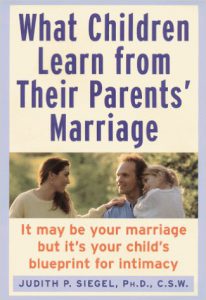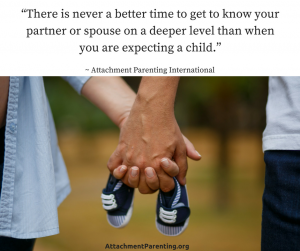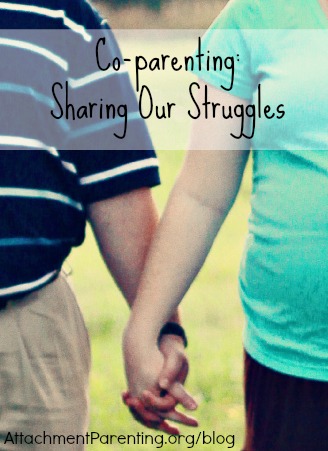Tag: marriage
The Most Interesting Things in API Reads this February
 I just finished reading the book What Children Learn from Their Parents’ Marriage by Judith P. Siegel. You’ve probably been seeing quotes from the book over the past month as I’ve been reading along.
I just finished reading the book What Children Learn from Their Parents’ Marriage by Judith P. Siegel. You’ve probably been seeing quotes from the book over the past month as I’ve been reading along.
I am so glad I picked up this book to read. I personally feel it is a must-have resource for every parent.
As attached parents, we focus so much energy on our children. After our focus on our children, we remember that word — “balance” — and try to make ourselves a priority, because we don’t want to burn out on the family. Our marriages may be last on the list, and if so, it begins to suffer.
With this book, the author shows you through research, vignettes, and her writing how you are only doing a disservice to your children when not giving your marriage the attention it needs. Just as the title states, your marriage is a blueprint for what type of relationships your children have when they reach the teen and young adult years:
- If you are not going on dates, how are your children going to know what a date looks like?
- If you are not providing affection to each other, how are your children going to feel comfortable in their own relationship to provide it?
- If you are not talking respectfully and equally to each other, how are your children going to know they deserve this in their own relationships?
These are just a few questions answered in the book that helps you see your marriage in a different light.
I highly suggest reading this book even if you feel your marriage is good. You are, after all, setting the stage for how love feels, looks, and acts in a marriage or partnership.
Strengthening AP marriages
By Lysa Parker and Barbara Nicholson, cofounders of Attachment Parenting International (API) and coauthors of Attached at the Heart
“Couples who are having difficulties in their relationship will find parenting to be an added stressor, not necessarily the blessing that solves all their problems.” ~ Attached at the Heart by Lysa Parker & Barbara Nicholson
 In Attached at the Heart, we talk about Jay Belsky’s research on the transition to parenthood and how incredibly difficult it can be for couples, even couples who are strong in their relationships.
In Attached at the Heart, we talk about Jay Belsky’s research on the transition to parenthood and how incredibly difficult it can be for couples, even couples who are strong in their relationships.
The transition to parenting is stressful in itself as new parents adjust to a new baby, and only intensifies issues in weak relationships.
Belsky’s research has found common areas of conflict in marriages, most notably money, household chores, work, social life and the couple relationship. Add to that: childhood wounds that emerge under stress.
Regardless of parenting choices, marriages or committed couple relationships can be put to severe tests if both parents cannot agree. We would add that additional stress on marriages can also come from parents and in-laws who may be critical of your choices.
We know all too well that to choose Attachment Parenting (AP) is not the easy road in our society. It’s not easy, because it goes against a tidal wave of generations of cultural beliefs and myths. It’s not easy, because it causes many of us to face certain realities of our own childhood experiences in order to help us become better parents.
At the same time, this experience can be freeing and empowering to be awakened and to make a conscious decision about changing family legacies and making a difference in the world.
For parents who have themselves experienced abuse, it can be very difficult to feel confident about doing things differently than their parents because they didn’t have positive role models. That’s why our local API Support Groups are so important — to provide not only education and support but modeling by more experienced AP parents.
It’s no one’s business why any person decides to get divorced. In any divorce situation, what must be the highest priority is the physical and emotional welfare of the children. All children deserve both parents involved in their lives, and it takes conscious effort and commitment.
Marriage, like child rearing, takes effort to educate oneself, to seek out resources and to find professional help if needed. There are so many great resources available now for couples and we have included some that we know and trust:
Warning Signs
A good reminder for couples is to be aware of Dr. John Gottman’s “Four Horsemen of the Apocalypse” that have been found to lead to divorce. If you recognize yourself, then it’s time to get professional help:
- Criticizing each other
- Contempt (feeling disgusted or fed up)
- Defensiveness (making excuses)
- Stonewalling (when one spouse shuts down emotionally).
Strong Family Characteristics
In 1985, Stinnett & DeFrain published the results of an extensive research project designed to learn more about the characteristics that were associated with strong families (Secrets of Strong Families, NY: Berkley Books). They identified 3,000 strong families throughout the United States and conducted extensive interviews with family members. The families represented a true cross-section of the population on many dimensions. After careful analysis, they determined there were six primary features that strong families have in common:
- Commitment – Family members were committed to their relationships and to helping each member grow as an individual.
- Appreciation – Family members frequently told and showed each other that they appreciated each other, and they were able to be specific about the things they expressed.
- Communication – These families used good communication skills, and they communicated frequently with each other.
- Fun Time Together – Strong families made time together a priority, and some of that time was spent doing enjoyable, fun things.
- Spiritual Wellness – Whether it was involvement in their own respective religious groups or involvement in inspirational activities such as deep appreciation of nature or music, strong families reported that their spirituality helped them keep perspective on the day-to-day stresses.
- Coping Ability – When these families encountered tough times, they found a way to pull together and support each other rather than being fragmented by crises.
Relationship Therapy
Counseling for your relationship can make a world of difference, in times of trouble and for prevention, too. There are three schools of marriage counseling therapy compatible with Attachment Parenting, so you’ll want to make sure your counselor is accredited with one of these programs: Gottman Method Couples Therapy, Imago Relationship Therapy and Emotionally Focused Therapy. The API Marriage Resources page offers more information on these programs and what type of questions to ask before engaging a therapist.
For example, if you are struggling in your relationship, you can find out if there is an Imago therapist in your area. Imago focuses on couple communication using a specific dialogue technique and addresses possible adult attachment issues that often interfere with intimacy and expression of feelings, a perfect complement to the Attachment Parenting approach. This program has helped many couples preserve their marriage when they felt on the edge of divorce.
An easy — and inexpensive — way to get started is for both parents to read the book Getting the Love You Want by Imago’s founders Dr. Harville Hendrix and Helen Hunt, and discuss each chapter as you go along. That alone can awaken awareness.
Be sure to see what’s available and what serves your family best.
Strengthening Communication Skills
Nonviolent Communication (NVC) is another great way to help couples develop better communication and understanding of individual needs and feelings. After attending many workshops and being involved on a personal level with NVC, we have learned just how illiterate most of us are when it comes to knowing what our needs are, let alone identifying them with the correct words.
Striving for Balance
Remember API’s Eight Principles of Parenting includes Striving for Personal and Family Balance. It is critical not only for preserving relationships, but for our own personal health and well-being.
Our couple relationship is extremely important, and it’s important to not neglect it. Mothers especially can easily become consumed with caring for the children to the exclusion of themselves and their partners — we’ve been there — and it’s not healthy for anyone. A strong AP support network will make it easier to share caregiving, if needed, so you can focus on your relationship.
Divorce is an extremely difficult decision for any family. While our culture remains content on labeling, judging and criticizing, let’s stay focused on what’s important in strengthening our marriages and family relationships to create a culture of empathy, support and peace for our children.
Co-parenting: Sharing Our Struggles
Successful relationships require humility, that is, the ability to view our own wants and needs on a larger scale, which includes the wants and needs of others. As attachment parents, many of us know the importance of balancing our wants and needs with those of our child.
In marriage, this balance can be a bit more difficult, especially if our co-parent is not necessarily on the same page as us when it comes to parenting decisions. “They should know better” we argue, and too often lose our humility in dealing with adults. But, nobody is perfect.
When I first became an attachment parent, my husband didn’t immediately hop on board with all of the principles (and the resulting methods) that I was proposing we practice. And I must admit, the principles of attachment parenting and nonviolent communication didn’t quite carry over in the practice of my marriage.
Many times, I would tell my husband outright that his way of parenting was wrong, and that I was opposed to the way he was choosing to parent – the same way I had parented just months before. I pitted his actions against my philosophy.
What I failed to realize was this: While my parenting philosophy had changed, a change in my everyday parenting practices and reactions had yet to catch up. I had years of parenting beliefs and vices I needed to unlearn, and my husband was no different.
My arguing with him didn’t make him want to cooperate, but instead put him in a defensive mode. I wasn’t winning him over with this approach, that’s for sure!
What I was doing was the opposite of what I would want someone to do if I made a parenting mistake. I know I wouldn’t respond well if someone pointed out my every mistake in the heat of the moment. It almost always makes things worse.
I had my own parenting struggles, and he didn’t seem to respond to mine in the same manner. I realized what a hypocrite I was being.
Opening Communication
I decided to start showing some humility. Knowing that I still had my own parenting difficulties, I would share something I was struggling with, and ask for his advice.
It went something like this: “I really want to stop raising my voice at the kids, but it just seems to happen automatically when I’m frustrated. What do you think I should do?”
By humbling myself, they became “our” struggles, and we truly became partners on this parenting journey. Over time, once it became clear to him that I would no longer be singling out his behavior, he began to feel comfortable enough to open up to me about his own personal struggles.
Yes, it’s possible to feel connected to your partner even if you don’t share exactly the same views on parenting, and even if one of you has less visible struggles than the other. Some marriages require a bit more humility (read: balance) than others.
If you’re looking to open the lines of communication in your home, pick behaviors and issues that you both struggle with. Don’t single out something that only your spouse struggles with. Don’t use this as an opportunity to pick apart your spouse’s parenting. Be real. Be humble.
When we are humble, we can see that we are not “better” than other parents. We all have our hangups. We are all still learning and growing.
Tip: This also works with other family members and friends. And our kids!



